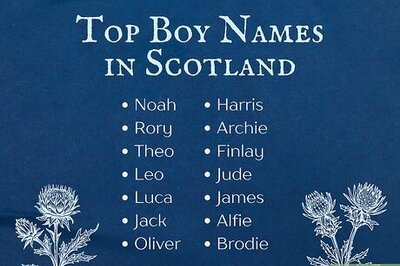
views
Baghdad: A series of bombings and attacks left at least 21 people dead and more than a dozen others wounded in Iraq on Thursday.
Gunmen attacked a checkpoint north of Baghdad, killing 10 Iraqi security forces -- six Iraqi soldiers and four police, an official with the Salaheddin Joint Coordination Center said.
According to the official, a large number of gunmen fired on the joint checkpoint in al-Dour, about 90 miles north of Baghdad.
Al-Dour is the home town of Izzat Ibrahim al-Douri, the deputy prime minister under former Iraqi leader Saddam Hussein.
In Mosul, gunmen attacked an Iraqi police patrol around midday, killing four officers in the city's al-Suker neighborhood. Mosul is about 225 miles (360 km) north of Baghdad.
Several hours earlier, in Baghdad, four people were killed and 11 others wounded when a bomb exploded in a market in the southeastern neighborhood of al-Zafaraniya -- a predominantly Shiite part of the city.
In western Baghdad, an Iraqi police commando was killed and two other commandos wounded in a roadside bomb attack on their patrol in the al-Jihad neighborhood.
At midday, two people were killed and four others were wounded after their minibus was hit by a roadside bomb in Sadr City, a Shiite neighborhood in eastern Baghdad, Iraqi Emergency police said.
About 20 miles south of Baghdad, an oil pipeline was burning in al-Musayyib, following a rocket-propelled grenade attack by insurgents Wednesday night, a Hilla police spokesman said.
According to the spokesman, the pipeline runs from the al-Dora refinery in Baghdad to al-Musayyib power station.
Gunmen shot at firefighters as they rushed to the scene, wounding two of them. Police arrived a short time later and engaged the insurgents in an hourlong gun battle, the spokesman said.
Police detained seven people -- three who had been wounded in the shootout.
At least 38 Iraqis died in violence Wednesday. They were among more than 400 Iraqis killed amid sectarian fighting that ripped through the tense country after a revered Shiite shrine in Samarra was bombed on February 22, setting off reprisals against Sunnis that led to retaliation against Shiites.
US and Iraqi officials are trying to persuade local and regional leaders to work quickly and put a lid on the hatred, fearing that the tit-for-tat bloodshed will deteriorate into a civil war.
Iraqi political leaders were scheduled to meet Thursday to discuss the security situation and how to cobble together a national unity government, said Ridha Jawad, a spokesman for the Shiite-led United Iraqi Alliance, which won the most seats in December's parliamentary election.
One issue that may be raised is the key nomination of a prime minister by the alliance. Last month, the coalition voted to nominate transitional Prime Minister Ibrahim al-Jaafari to the post.
The winning party gets first crack at nominating a prime minister, but its choice must win approval in the parliament. Political leaders are trying to agree on an acceptable candidate before the vote is taken.
Al-Jaafari is a Shiite and a member of the Dawa Party, which is part of the alliance.
He won last month's coalition ballot by one vote over Adel Abdul Mehdi, from the Supreme Council for the Islamic Revolution in Iraq, and was pushed over the top by support from followers of firebrand Shiite cleric Muqtada al-Sadr.
However, opposition to al-Jaafari has been growing, particularly from Kurds and the Sunni-led Iraqi Accord Front, and the Shiite coalition is being pressured to reconsider its decision, Jawad said.
The criticism stems more from his performance over the past year than the deteriorating security environment in Iraq.
He came under intense criticism as a transitional prime minister for not being a strong enough leader, for not forcing compromise among the various political entities, and for not delivering adequately on the basics -- water and electricity, as well as security.

















Comments
0 comment